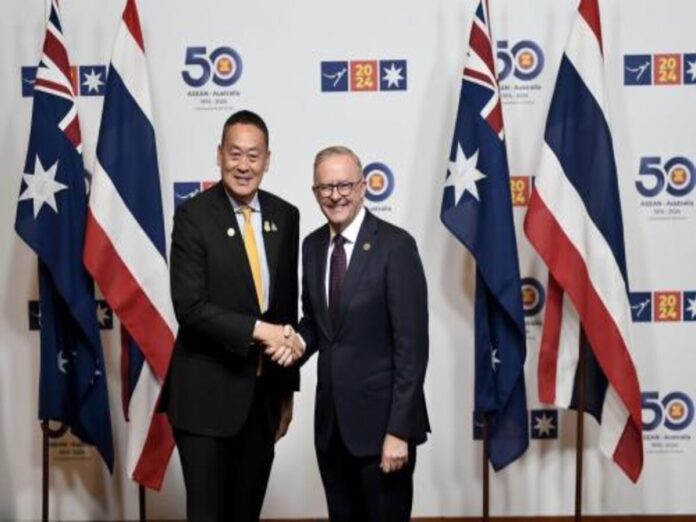In a significant development, Thailand and Australia have pledged to bolster collaboration across various sectors, including trade, investment, tourism, technology, and innovation. The commitment was solidified during discussions between Prime Minister and Minister of Finance Srettha Thavisin and Australian Prime Minister Anthony Albanese at the 2024 ASEAN-Australia Special Summit in Melbourne on March 4-6.
The focal point of these discussions revolved around fortifying the existing Thailand-Australia Free Trade Agreement (FTA) to align with the contemporary landscape. Notably, trade between the two nations has surged by an impressive 186 percent under the current FTA framework.
Prime Minister Srettha expressed Thailand’s keen interest in gleaning insights from Australia’s best practices, particularly in agriculture, clean energy, electric vehicles, and smart industries. In return, Prime Minister Albanese highlighted Thailand’s pivotal role as a major strategic partner for Australia.
During the summit, Prime Minister Srettha proposed signing a memorandum of understanding on tourism cooperation, emphasizing the need for increased direct flights and expanded work and holiday visa quotas between the two countries.
Addressing educational collaboration, the Thai Prime Minister revealed plans to encourage the establishment of branches of Australian educational institutions in Thailand, focusing on personnel exchange and collaborative vocational education programs.
Prime Minister Srettha advocated for a phased implementation of Australia’s New Vehicle Efficiency Standard (NVES) to support Thai auto manufacturers transitioning from internal combustion engine vehicles to electric vehicles.
Thailand’s annual export of over 200,000 automobiles to Australia was a key focus, with Prime Minister Srettha calling for understanding and cooperation in implementing NVES to facilitate a smoother transition.
In the realm of labor mobility, both nations explored avenues for enhanced cooperation, including facilitating Australian digital nomads working from Thailand and facilitating Thai workers venturing to Australia to address labor shortages.
A noteworthy proposal from Prime Minister Srettha involved the potential hiring of Thai farmers by Australia, particularly during peak harvest seasons. This initiative aims to address labor demands and may be initiated as a pilot project or in response to specific regional needs.
Beyond economic collaboration, Thailand and Australia committed to exchanging military technology, fostering the development of military personnel, and intensifying efforts under the ASEAN-Australia Counter Trafficking program. This program is designed to combat human trafficking, modern slavery, and forced labor across the broader ASEAN region.



